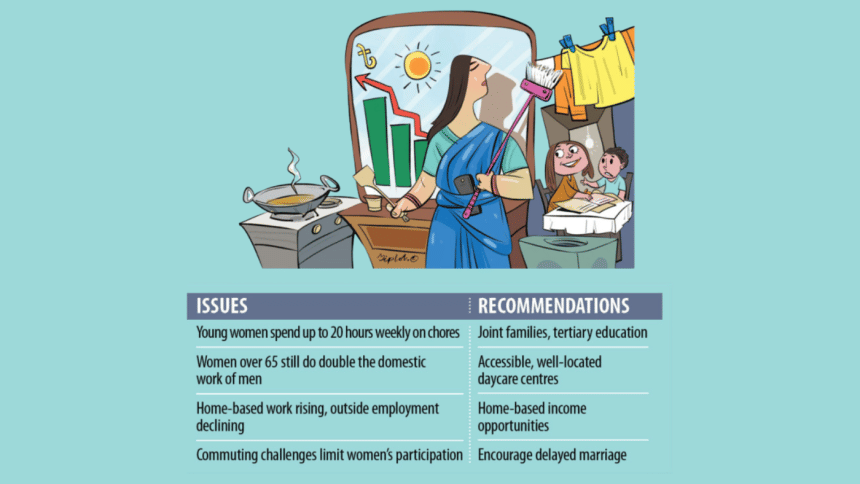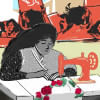Domestic chores hold women back from formal jobs

Not the lack of education; rather, care responsibilities are the main reason why Bangladeshi women, especially young women, remain outside formal employment, revealed a new study by the Bangladesh Institute of Development Studies (BIDS) and Sajida Foundation.
The research found that 81 percent of women cited household duties as their biggest barrier to joining the labour force, while 48 percent of men pointed to education as the main challenge.
Young women aged 15–24 spend up to 20 hours a week on domestic chores -- four times more than their male peers. Even women over 65 continue to spend double the time men do on household work.
Dr Sajeda Amin, senior research advisor at Sajida Foundation, presented the findings of the study, titled "Care Responsibilities and Women's Work in Bangladesh", at a seminar organised by BIDS at its Agargaon office in Dhaka yesterday.
Drawing on nationally representative data from the 2016 Labour Force Survey (LFS), the study noted that Bangladesh's rising female labour force participation (FLFP) is driven mainly by home-based work rather than jobs in offices, factories, or farms.
While 66 percent of women remain outside the labour force compared to just 20 percent of men, more women are taking up income-generating activities from home or nearby, as they juggle childcare, household management, and care for the elderly or sick.
The data show a sharp rise in women's home-based work across rural areas.
Agricultural work outside the home dramatically fell from 64 percent in 2010 to 21 percent in 2016, as rural women shifted to agro-processing and informal activities.
Meanwhile, urban women's participation in outside work has declined.
Another key finding was the positive impact of joint families. Unlike in India, women in Bangladesh living in joint households are more likely to work outside the home, as extended family members share childcare and domestic duties, reducing women's care burden and increasing productive hours.
The study also found that tertiary education significantly improves women's chances of engaging in productive work and reduces time spent on unpaid chores. Secondary education, however, has limited effect due to persistent cultural and care-related barriers.
The report recommended recognising the care economy in labour policy, supporting agro-processing and rural enterprises, promoting delayed marriage to enhance opportunities for young women, and encouraging equitable sharing of household responsibilities to address gender imbalances.
At the seminar, Prof A K Enamul Haque, director general of BIDS, said women's participation in the workforce drops sharply when they have children under five and stressed the need for accessible day care centres.
He noted that Western-style daycare centres in garment factories often failed because mothers could not bring their children to the facilities, even though the centres were well-equipped.
Accessible and well-located daycare centres are key to increasing women's workforce participation, he said, adding, "Evidence shows that centralised factory-based centres often fail, whereas location-based centres near homes are far more effective for working mothers."
Prof Enamul also pointed to unreliable and unsafe urban transport system as another major barrier preventing women from taking up jobs.
Navanita Sinha, deputy representative of UN Women, said investing in basic care services can yield significant returns, citing OECD research that showed 30–40 percent gains in women's employment. She expressed hope for similar evidence from Bangladesh.
She also emphasised that care is a complex issue that requires both quantitative and qualitative research to be fully understood.

 For all latest news, follow The Daily Star's Google News channel.
For all latest news, follow The Daily Star's Google News channel. 






Comments